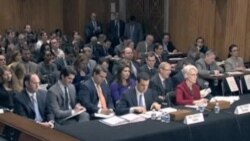CAPITOL HILL —
A U.S. Senate hearing has further exposed tensions between lawmakers and the Obama administration about international negotiations to limit Iran’s nuclear program. U.S. officials sought to reassure skeptical legislators of both parties that diplomacy can succeed, and that Iran will be amply punished if it fails.
Senate Foreign Relations Committee Chairman Robert Menendez wanted to know if a final accord with Iran would freeze its ability to make a nuclear weapon or eliminate it entirely.
“A final agreement that mothballs [halts] Iran’s [nuclear] infrastructure, but preserves their ability to easily break out [become a nuclear-armed nation] is not a final agreement I can support,” he said.
Menendez has crafted a bill spelling out additional sanctions against Iran if talks break down. The measure has put him in conflict with fellow-Democrat President Barack Obama, who has pledged to veto any measure that could torpedo negotiations. Menendez feared Iran would wriggle free of sanctions while retaining its nuclear weapons capacity.
“We need to guard against wanting a deal so much that we concede more than we gain. At the end of the day, Iran can no longer be a nuclear weapons-threshold state,” he said.
Other senators were more blunt. Republican James Risch called the interim nuclear agreement a “disaster” and said he was “disgusted” by limited sanctions relief for Iran.
“You have got business people flooding in there, ready to do business [with Iran], going back to business as usual with the Iranians," he said. "Whose job is it going to be to put the genie back in the bottle [restart sanctions] when this thing [diplomacy] fails?”
Appearing before the committee, Under Secretary of State for Political Affairs Wendy Sherman stressed that no final accord would be soft on Tehran.
“We remain in control over whether to accept the terms of a final deal or not," she said. "We have made it clear to Iran that if it fails to live up to its commitments, or if we are unable to reach agreement on a comprehensive solution, we would ask Congress to ramp up new sanctions immediately.”
Several senators expressed concern if the time it took to enact new sanctions Iran could accelerate its nuclear program. U.S. Treasury Under Secretary David Cohen responded that the economic relief Tehran currently enjoys was small and reversible.
“If Iran fails to meet its commitments under the joint plan, we can revoke this limited sanctions relief and, at a minimum, reinstate the suspended sanctions,” he said.
Not all senators are equally pessimistic about diplomacy with Iran. Democratic Senator Tim Kaine said he was prepared to vote for military action, if needed, to keep Iran nuclear weapons free. But he argued for a good-faith pursuit of diplomacy before drastic measures are contemplated.
Senate Foreign Relations Committee Chairman Robert Menendez wanted to know if a final accord with Iran would freeze its ability to make a nuclear weapon or eliminate it entirely.
“A final agreement that mothballs [halts] Iran’s [nuclear] infrastructure, but preserves their ability to easily break out [become a nuclear-armed nation] is not a final agreement I can support,” he said.
Menendez has crafted a bill spelling out additional sanctions against Iran if talks break down. The measure has put him in conflict with fellow-Democrat President Barack Obama, who has pledged to veto any measure that could torpedo negotiations. Menendez feared Iran would wriggle free of sanctions while retaining its nuclear weapons capacity.
“We need to guard against wanting a deal so much that we concede more than we gain. At the end of the day, Iran can no longer be a nuclear weapons-threshold state,” he said.
Other senators were more blunt. Republican James Risch called the interim nuclear agreement a “disaster” and said he was “disgusted” by limited sanctions relief for Iran.
“You have got business people flooding in there, ready to do business [with Iran], going back to business as usual with the Iranians," he said. "Whose job is it going to be to put the genie back in the bottle [restart sanctions] when this thing [diplomacy] fails?”
Appearing before the committee, Under Secretary of State for Political Affairs Wendy Sherman stressed that no final accord would be soft on Tehran.
“We remain in control over whether to accept the terms of a final deal or not," she said. "We have made it clear to Iran that if it fails to live up to its commitments, or if we are unable to reach agreement on a comprehensive solution, we would ask Congress to ramp up new sanctions immediately.”
Several senators expressed concern if the time it took to enact new sanctions Iran could accelerate its nuclear program. U.S. Treasury Under Secretary David Cohen responded that the economic relief Tehran currently enjoys was small and reversible.
“If Iran fails to meet its commitments under the joint plan, we can revoke this limited sanctions relief and, at a minimum, reinstate the suspended sanctions,” he said.
Not all senators are equally pessimistic about diplomacy with Iran. Democratic Senator Tim Kaine said he was prepared to vote for military action, if needed, to keep Iran nuclear weapons free. But he argued for a good-faith pursuit of diplomacy before drastic measures are contemplated.





